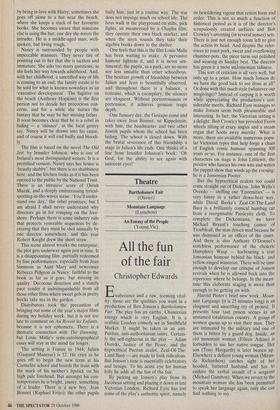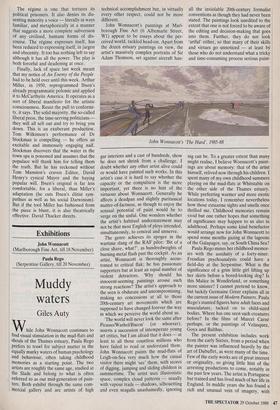Theatre
Bartholomew Fair (Olivier) Mountain Language (Lyttelton) An Enemy of the People (Young Vic)
All the fun of the fair
Christopher Edwards
Exuberance and a raw, teeming vital- ity: those are the qualities you want in a production of Ben Jonson's Bartholomew Fair. The play has an earthy, Chaucerian energy which is very English. It is a realistic London comedy set in Smithfield Market. It might be taken as an anti- Puritan, anti-authoritarian satire. Certain- ly the self-righteous in the play — Adam Overdo, Justice of the Peace, and the hypocritical Puritan zealot, Zeal-Of-The- Land Busy — are made to look ridiculous. But Jonson's tone is essentially celebratory and benign. To his acute eye for human folly he adds all the fun of the fair.
By picking up Jonson's play from its Jacobean setting and placing it down in late Victorian London, Richard Eyre has lost some of the play's authentic spirit, namely its bewildering vigour that resists form and order. This is not so much a function of historical period as it is of the director's scrupulously created surfaces and Bob Crowley's arresting (in several senses) sets. There is just not enough room left to give the action its head. And despite the refer- ences to roast pork, sweat and overflowing chamber-pots, the piece turns out polished and wearing its Sunday best. The director has given it a most unJonsonian tidiness.
This sort of criticism is all very well, but only up to a point. How much. Janson do we have the good luck to see done at all? Or done with this much style (whatever our misgivings)? Instead of carping it is worth while appreciating the production's con- siderable merits. Richard Eyre manages to make Jonson seem both pleasurable and interesting. In fact, the Victorian setting is a delight. Bob Crowley has provided Ferris wheels tilting at crazy angles and a steam organ that hoots away merrily. What is more, there are available numerous popu- lar Victorian types that help forge a chain of English comic humour spanning 300 years or-so. For instance, one of the first characters on stage is John Littlewit, the proctor who fancies his own wits and writes the puppet show that winds up the evening; he is a Jonsonian Pooter.
But the hypocritical zealots too could come straight out of Dickens. John Wells's Overdo — sniffing out 'Enormities' — is very funny in a rather down-beat way, while David Burke's Zeal-Of-The-Land Busy is a brilliantly comical humbug cut from a recognisable Paisleyite cloth. To complete the Dickensiana, we have Michael Bryant's touching cameo of Troubleall, the man driven mad because he was dismissed as an officer of the court. And there is also Anthony O'Donnel's matchless performance of the choleric Humphrey Wasp — harbouring a true Jonsonian humour behind his black- and yellow-ringed waistcoat. There will be time enough to develop our critique of Jonson revivals when he is allowed back into the repertoire where he belongs. In the mean- time this elaborate staging is more than enough to be getting on with.
Harold Pinter's brief new work, Moun- tain Language (it is 25 minutes long) is an eloquent and unsettling cry of protest. It presents four taut prison scenes in an unnamed totalitarian country. A group of women queue up to visit their men. They are intimated by the military and one of them is bitten by a guard dog. Inside, an old mountain woman (Eileen Atkins) is forbidden to use her native tongue. Her son (Tony Haygarth) is later beaten up. Elsewhere a defiant young woman (Miran- da Richardson) catches sight of her hooded, battered husband and has to endure the verbal assault of a sergeant (Michael Gambon). When we revert to the mountain woman she has been permitted to speak her language again, only she can find nothing to say.
The regime is one that tortures its political prisoners. It also denies its dis- senting minority a voice — literally in ways familiar, and metaphorically in a manner that suggests a more complete subversion of any civilised, humane forms of dis- course. The regime expresses itself, has been reduced to expressing itself, in jargon and obscenity. It too has nothing left to say although it has all the power. The play is both forceful and deadening at once.
Finally, lack of space last week meant that my notice of An Enemy of the People had to be held over until this week. Arthur Miller, in 1950, reprogrammed Ibsen's already programmatic polemic and applied it to McCarthyite America. It operates as a sort of liberal manifesto for the artistic consciousness. Resist the pull to conformi- ty, it says. The solid majority, the so-called liberal press, the time-serving politicians they will all sell out and try to bring you down. This is an exuberant production. Tom Wilkinson's performance of Dr Stockman is compelling — he offers an excitable and immensely engaging naïf. Stockman discovers that the water in the town spa is poisoned and assumes that the populace will thank him for telling them the truth. But he has reckoned without Tom Mannion's craven Editor, David Henry's cynical Mayor and the baying popular will. Ibsen's original is far less comfortable, for a liberal, than Miller's adaptation (he cuts Ibsen's elitist sym- pathies as well as his social Darwinism). But if the tool Miller has fashioned from the piece is blunt, it is also theatrically effective. David Thacker directs.



























































 Previous page
Previous page